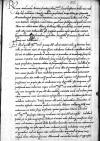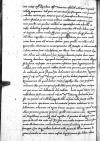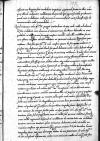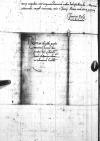Sunt 1533-06-06⌊hesterno mihi die1533-06-06⌋ redditae litterae ⌊dominorum⌋ utriusque ordinis praelatorum ⌊terrae istius⌋ ex ⌊conventu⌋ Marienburgensi proxime superiori. ⌊Cui⌋, ut persuasum habeo, Vestra Dominatio Reverendissima non tantum interfuit, verum etiam, quod eius fastigio, ad quod eam evectum iri voluit Deus, illiusque doctrinae, illius prudentiae ac rerum peritiae iusto utique iure tribuendum est, praefuit. Quibus agunt apud me causam legatariorum [a]tque heredum domini olim magistri ⌊Francisci Harth⌋ wladarii mei Sobcoviensis.
Et illud quidem, Reverendissime Domine, parvae est admirationi mihi, quod homines leviculi, ne dicam vani et nugacissimi nebulones habendi cupiditate ducti, tot me et talibus querelis et calumniis et praesulem, et inculpatae famae hominem impetere non dubitarunt suisque maledicis linguis praescindere, in tanti praesertim ⌊senatus⌋ celebri et frequentissima corona. Sed illud potius miror miransque stupeo, quod apud ⌊viros illos⌋ et graves, et prudentes tam aures faciles et tam credulas invenere. Quibus etiam potuerunt persuadere me, nulla umquam, quod scio, notatum rapina vel istiusmodi oppressione, sic praeter fas et condicionis meae dignitatem esse iniquum etc.
Potissimum vero admiror super Vestra Dominatione Reverendissima, cui anteacta vita mea est utique non incognita et quae est diu multumque versata mecum ad aulam ⌊principis⌋, maxime cum iam totiens rescripserim ei super his, totiens facti mei reddens rationem. Utcumque tamen est, dominis scribentibus communiter communiter rescribo, crimina, quibus insimulor, diluens reddensque facti mei rationem, rei totius serie explicata. Quam, quia iam totiens ad Vestram Dominationem Reverendissimam ⌊⌋ totiensque inculcavi, non opus est, ut repetam. Sed illud potius ex ea peto magnopere, tribuat et aures mihi fidemque verissimis dictis meis vel tantam, quantam dedit hominibus leviculis meras in me calumnias congerentibus. Nec plus apud eam valeant quicumque nebulones viris probis et gravibus, sed sit digna ratio communis nobis dignitatis et famae meae, numquam alias, ut liceat gloriari, istiusmodi criminibus iniuriae et oppresionis notatae etc.
Equidem, Reverendissime Domine, nihil est actum per iniquitatem nihilque perperam, sed quia, ut rem iterum perstringam, cum poneretur calculus rationis per notarios, quos dominus ⌊Franciscus⌋ in bonis meis, quae administrabat, ex suo unius arbitrio constituerat, rationis, inquam, non exactae nec qualem redditum iri oportuisset, immo admodum remissae deductisque impensis necessariis, inventus est mihi debere centum et triginta, si bene recolo, florenos. Quos [du]m non essent solvendo, est illius supellex in vim quasi pignori[s] detenta per viam arresti. Cuius bona pars est, ut reor, ⌊Gedani⌋, pars quaedam, ne vestes vel id genus alia situ tineisve corrumperentur, est fortasse in ⌊Sobcow⌋ avecta. Codices autem sunt ⌊Wladislaviae⌋ per ⌊illum⌋, dum adhuc viveret, depositi. Ad me autem nihil, quod scire possum, devenit praeter duos equos, utrumque claudum. Quicquid tamen est fuitve, quae sunt omnia diligenter fideque bona conscripta, sum paratus restituere ipsis legatariis aut heredibus, cum mihi primum reddita fuerit mea pecunia aut sponsores de reddenda positi. Id quod feci declaratum iam alias tam legatariis ipsis, quam Vestrae Dominationi Reverendissimae, facioque et ⌊dominis⌋, qui his diebus scripserunt ad me, quamvis non est, quod dicitur, tanti supellex illa, cum praesertim coclearia illa, quae eius ipsius supellectilis pars fuit potissima, sint per eos, qui in me nunc deblaterant, dolo sublata.
Licet, inquam, totiens iam reddiderim facti mei rationem Vestrae Dominationi Reverendissimae totiensque declaratum fecerim esse me paratum ad reddendam supellectilem, cum primum mihi fuerit reddita mea pecunia, ipsa tamen, non his contenta, patitur nebulones in me deblaterare, adiuvans vel agens eorum causam meamque apud ⌊terrae istius primores⌋ gravans opinionem, equidem cum iniuria mea. Quaeratur enim ⌊Augustinus⌋ excutianturque iterum regestra, et ponatur de integro, si ita opus facto est, tota ratio etc. Et quamvis non multo tempore administraverit ⌊ille⌋ bona mea, census tamen omnes fructusque et proventus percepit. Cum itaque nullam habent iuste querendi de me causam legatarii heredesve, cum nemo nesciat legatis priora esse debita, obsecro, cessent me linguis suis maledicis impetere. Aequus enim fuero in illos omnia, quae illorum videntur, redditurus, dummodo ipsi aequos se mihi praebeant. Quod erit, si debitam mihi pecuniam numerabunt aut fideiussoribus de numeranda mihi providebunt.
Quodsi tamen Vestra Reverendissima Dominatio perget contendere et, quae vult, velle ad ultimum, ut sim videlicet cum damno et iniuria mea facilis ac liberalis in eius subditum et al[ios], quorum suscepit causam tuendam, cedendum constitui sic, ut rem istam om[n]em aliorum arbitrio, ut ipsamet voluerit, cognoscere permittam. Aut sola ipsa Reverendissima Dominatio Vestra causam ipsam de suo ipsius arbitrio cognoscat atque definiat, quantum illud sit, quod debeant mihi, vel si debent aliquid. Maluero enim pecuniae potius quam famae et amicitiae iacturam.
Si namque alias amavi semper eandem Dominationem Vestram Reverendissimam, nunc est maxime animus istiusmodi amorem non intermittere, sed officiis eum omnibus alere atque in dies magis ac magis auctiorem reddere, cum sic visum superis est, ut sit uterque nostrum ad pontificalis dignitatis fastigium sublimatus et sit uterque alteri vicinus etc.
Me itaque commendo Reverendissimae Dominationi Vestrae. Quam diu praestet incolumem Deus.
Verum ut viva quoque voce coram suis fiat deductum probationibus suisque et indubiis argumentis me huius, cuius arguor, noxae immunem esse, vel hac una causa mittam ego brevi ad Vestram Reverendissimam Dominationem secretarium, velut obtinuit usus, cancellarium meum dominum ⌊Dambrowski⌋, ut praesens ei quoque praesenti, praesente quoque et parte ac vocatis ad hoc ipsum domino ⌊Dominico Camienski⌋ praefecto meo Sobcoviensi et ⌊Augustino⌋, qui omnes, dum poneretur ratio, interfuere et quibus est quam notissima huius totius tragoediae series, satisfaciat et tota ratione de integro facta, praesente, ut dixi, parte, Vestra autem Reverendissima Dominatione non tantum praesente, sed et praesidente una cum eadem, sed ex eius arbitrio simulque cum eadem cognoscat, definiat et constituat de causa tota, an videlicet tantum aut non tantum, plus minusve debeatur mihi et iuste an iniuria arrestum ego posuerim, idque genus omnia.
Ut sit tandem huius tragoediae finis sitque iam deinceps aliter de me persuasa Dominatio Vestra Reverendissima, et sit ad plenum instaurata inter nos amicitia, nulla iam umquam aut fortunae impulsu, aut iniquorum hominum rabie labefactanda.
Me iterum commendo.



